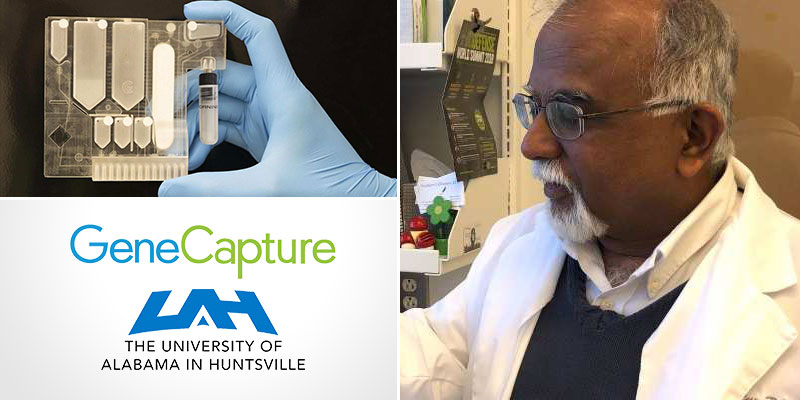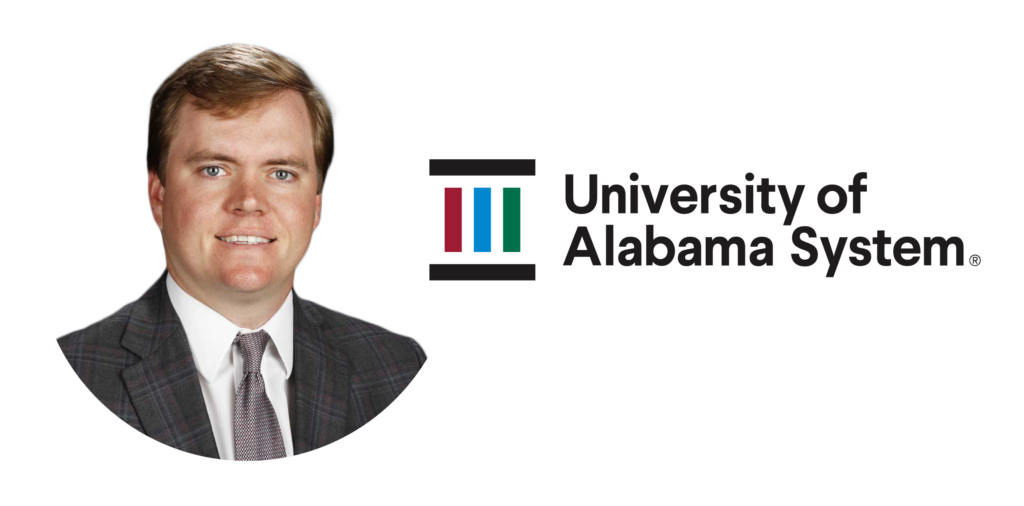Soon it could only take an hour to find out what pathogen is making you ill following the successful demonstration of the world’s first multi-pathogen identification using non-amplified RNA detection by GeneCapture, a company cofounded by researchers at the University of Alabama in Huntsville (UAH).
GeneCapture has licensed a molecular binding technology from UAH, and the company’s CAPTURE PLATFORM is on track for commercialization within two years.
The GeneCapture team has briefed the Food and Drug Administration (FDA) on its approach and has begun to prepare for the clinical testing required for FDA clearance. It is in discussions with industry leaders for various applications in health care rapid infection detection.
“We made history today – this is the first time an automated rapid pathogen identification has been reported directly from the RNA of the sample, with no modification or amplification of its genetic source, in about an hour,” said GeneCapture CEO Peggy Sammon. “We envision a future where finding out why you are sick can be solved almost anywhere, in an hour, and without being chained to a lab.”
The company’s unique disposable cartridge and portable reader platform enables rapid, inexpensive multi-pathogen detection at the point of care. Whether the illness is bacterial, viral, fungal or protozoan, a single test that’s estimated to cost around $20 will pinpoint the cause.
The novel technology consolidates sample prep and molecular signature detection in one plastic cartridge with a one-button portable reader.
The initial molecular binding concept was conceived by researchers at UAH and licensed exclusively to GeneCapture. The co-inventors on the original patent included Dr. Krishnan Chittur, professor emeritus in the Department of Chemical and Materials Engineering; Dr. Joseph Ng, professor in the Biological Sciences Department; Dr. Mark Pusey, UAH adjunct professor; and Jeff Dowell, who at the time was a student in UAH’s graduate program in Biotechnology Science and Engineering. In 2016, GeneCapture was awarded $100,000 in Alabama Launchpad’s inaugural LEAP Alumni Competition for local start-ups.
The partnership with GeneCapture is an example of a truly groundbreaking technology developed at UAH and being made available for the benefit of all, said Kannan Grant, director of UAH’s Office of Technology Commercialization.
“I would term this as a disruptive technology and not merely an incremental improvement to the current state of the science,” Grant stated.
“UAH research has been at the cutting edge of technology development,” he added. “UAH has always shown responsible stewardship so the fruits of taxpayer-funded research are being made available for public consumption at the earliest possible time.”
Since its founding, the company has filed an additional 11 patents, automated the process in a cartridge, built prototypes and performed successful pre-clinical validation tests. In addition to the commercial applications, the company has been awarded multiple Department of Defense contracts to mature the technology for potential military operational use.
GeneCapture’s CAPTURE PLATFORM has a closed cartridge that accepts a direct sample of urine, blood or a sample from a swab and then concentrates and exposes the pathogen’s RNA fragments to custom DNA probes on an array. Once the RNA is captured, the specific probes activate an optical sensor. The pattern across the array identifies the pathogen. Limits of detection have been validated and are currently clinically relevant for most bacterial infections. They are now being optimized for low-load viral infections.
Infection detection will soon be portable, fast and inexpensive, GeneCapture officials have advised.
“Just as the shift from relying on central computers to desktop and handheld devices enabled entirely new markets, so will decentralized, portable multi-pathogen infection detection enable new point of care markets,” Sammon explained.
A rapid diagnostic solution will fill a critical need, noted Dr. Louise O’Keefe, Ph.D., the director of UAH’s Faculty and Staff Clinic and an advisor to GeneCapture.
“Our industry needs a breakthrough in turnaround time for diagnostic results,” Dr. O’Keefe said. “GeneCapture’s approach will transform the challenges we deal with every day.”
Ray Garner is a contributing writer to Yellowhammer News. He is the retired chief of staff to the president at The University of Alabama in Huntsville as well as the former business editor of The Huntsville Times. Ray also served as a member of the Alabama House of Representatives.













